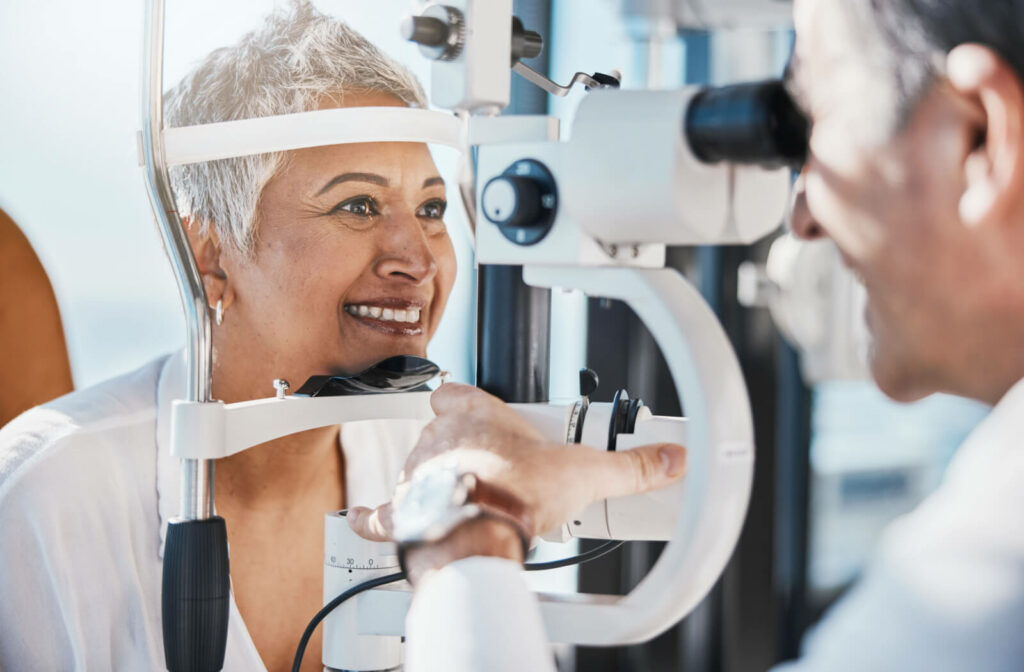One of the most common questions asked by optometry patients is how often they should get an eye exam. And while there is no simple answer to this question, as everyone’s eye health needs are unique, there are guidelines that can help you determine what’s best for you.
It’s recommended to receive an annual eye exam. However, the frequency depends on your age, medical conditions, whether you have concerning symptoms, your lifestyle, and your family history.
If you can’t remember the last time you had an eye exam, visit your optometrist for a comprehensive assessment of your vision and eye health.
How to Determine Eye Exam Frequency?
Age
Your age is one of the most significant factors determining how often you should get an eye exam.
- Children should have subsequent eye exams at 3 years old and 5 years old to make sure there is proper development for early learning.
- School-age children should have an eye exam once every year to make sure their vision is sufficient for school and learning.
- For adults aged 18-64, the eyesight should be checked at least once a year due to regular vision changes and health changes that can affect the eyes.
- For those 65 years and older, eye exams should be done annually due to the higher risk of eye disease.
These are only guidelines, and other factors will influence your optometrist’s recommendation for your eye exam frequency, including medical history, risk factors, and lifestyle.
Medical Conditions
If you have a pre-existing health condition such as hypertension or diabetes, your eye doctor will likely recommend an eye exam more frequently than the recommended age range. People with conditions like these are more likely to develop eye conditions such as diabetic retinopathy, cataracts, macular degeneration, and glaucoma. Regular eye exams can help detect these conditions early on, increasing the chances of successful treatment.
Symptoms
You should schedule an eye exam promptly if you notice changes in your eyesight, including:
- Blurry vision
- Double vision
- Frequent headaches
- Eye pain
- Flashes or floaters
- Dry or gritty eyes
- Difficulty with night vision
Additionally, if you experience an injury to your eye or head, you should seek emergency care to immediately address any damage to your vision and assess your eyes.
Lifestyle
Your lifestyle can impact how frequently you should get an eye exam. For instance, if you work long hours at a computer screen, you may experience eye strain and may benefit from more frequent eye exams to address potential digital eye strain or dry eye.
Similarly, if you play a high-impact sport such as basketball or soccer, you should schedule an eye exam to protect your eyes against the risk of injury. Other lifestyle factors may warrant more frequent eye exams, including:
- Wearing contact lenses
- Occupations that are hazardous to the eyes
- Whether you’re a smoker
- Prolonged UV exposure
Family History
If your family has a history of eye conditions such as glaucoma or macular degeneration, you may need an eye exam more often than the recommended guidelines. This is because certain eye conditions can be hereditary and affect multiple generations in a family.
What Tests Are Performed in an Eye Exam?
Visual Acuity Tests
Visual acuity tests assess how well you can see letter or number charts from a distance. During this test, you will be asked to identify letters or numbers of varying sizes from a standard distance. The results of this test help your optometrist determine if you have a refractive error such as nearsightedness, farsightedness, or astigmatism.
Refraction Test
After the visual acuity test, your optometrist will perform a refraction test. If needed, the refraction test determines the correct prescription for glasses or contact lenses. During this test, you look through a series of lenses of varying strengths to determine which ones provide the clearest vision. The results of this test help your optometrist figure out the correct lens prescription for you.
Intraocular Pressure Test
Glaucoma is a group of eye conditions that damages the optic nerve, typically because of increased intraocular pressure (IOP), leading to vision loss if left untreated. During an IOP test, your optometrist will use a tonometer device to examine the pressure in your eye.
They may also look for signs of optic nerve damage or thinning by analyzing the back of your eye. By detecting and treating glaucoma early, your optometrist can help protect your vision.
Retinal Exam
A retinal exam involves examining the back of your eye, where the optic nerve is located. This exam can reveal various issues related to the retina, including macular degeneration, diabetic retinopathy, and retinal detachment.
Maintain a Regular Eye Exam Schedule
Getting an eye exam can be integral to maintaining your vision and helping to prevent eye conditions early on. Don’t wait until something is wrong with your eyes and vision to get them checked.Schedule an eye exam at Eyes on Plainville to help maintain your eye health.





